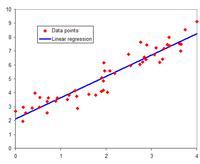
Photo from wikipedia
BACKGROUND Although KRAS mutation status is known to affect the prognosis of patients with colorectal liver metastasis, the hierarchical association between other prognostic factors and KRAS status is not fully… Click to show full abstract
BACKGROUND Although KRAS mutation status is known to affect the prognosis of patients with colorectal liver metastasis, the hierarchical association between other prognostic factors and KRAS status is not fully understood. METHODS Patients who underwent a hepatectomy for colorectal liver metastasis were identified in a multi-institutional international database. A classification and regression tree model was constructed to investigate the hierarchical association between prognostic factors and overall survival relative to KRAS status. RESULTS Among 1,123 patients, 29.9% (n = 336) had a KRAS mutation. Among wtKRAS patients, the classification and regression tree model identified presence of metastatic lymph nodes as the most important prognostic factor, whereas among mtKRAS patients, carcinoembryonic antigen level was identified as the most important prognostic factor. Among patients with wtKRAS, the highest 5-year overall survival (68.5%) was noted among patients with node negative primary colorectal cancer, solitary colorectal liver metastases, size <4.3 cm. In contrast, among patients with mtKRAS colorectal liver metastases, the highest 5-year overall survival (57.5%) was observed among patients with carcinoembryonic antigen <6 mg/mL. The classification and regression tree model had higher prognostic accuracy than the Fong score (wtKRAS [Akaike's Information Criterion]: classification and regression tree model 3334 vs Fong score 3341; mtKRAS [Akaike's Information Criterion]: classification and regression tree model 1356 vs Fong score 1396). CONCLUSION Machine learning methodology outperformed the traditional Fong clinical risk score and identified different factors, based on KRAS mutational status, as predictors of long-term prognosis.
Journal Title: Surgery
Year Published: 2020
Link to full text (if available)
Share on Social Media: Sign Up to like & get
recommendations!